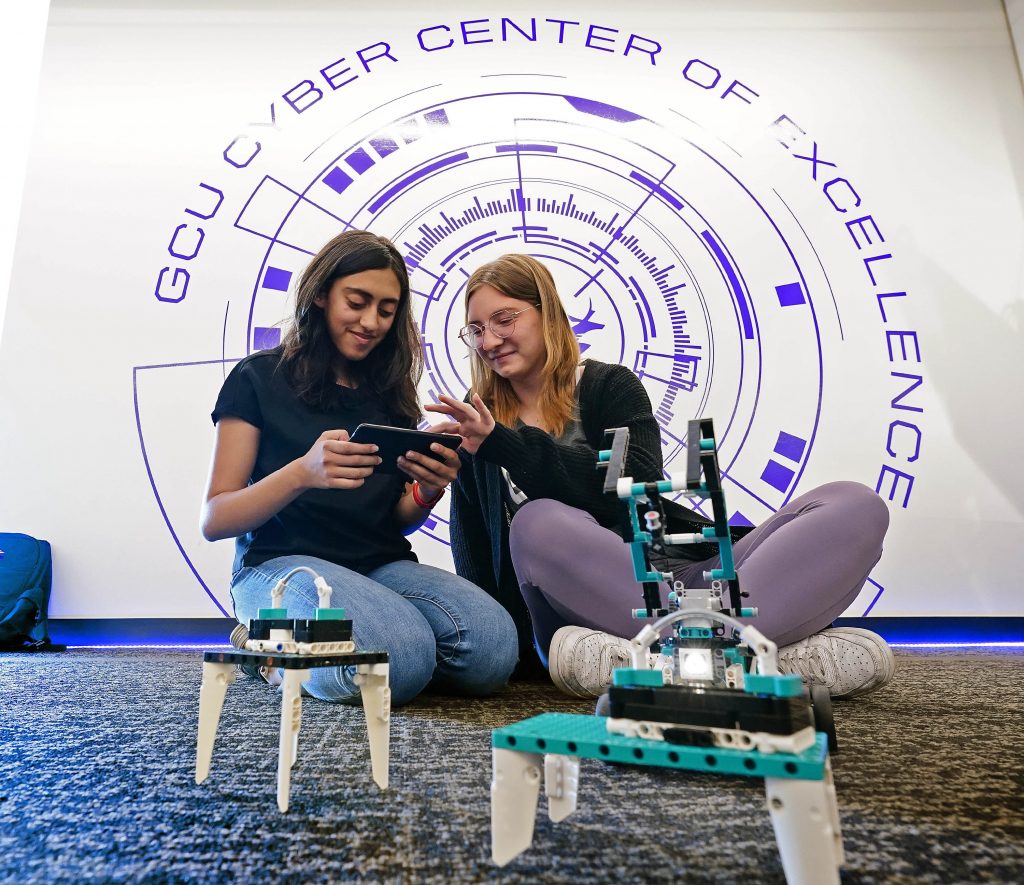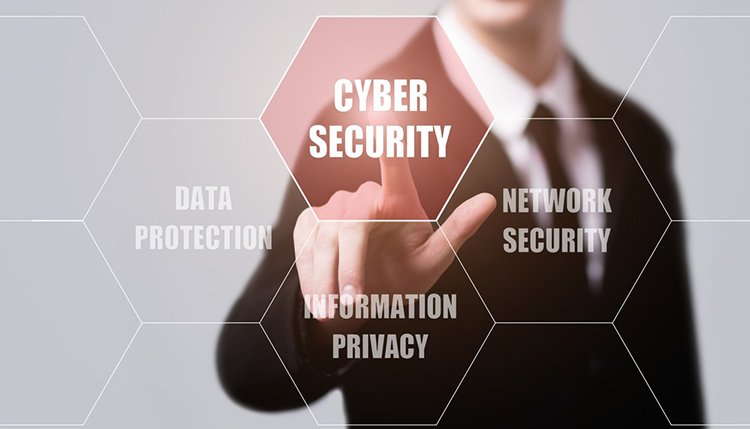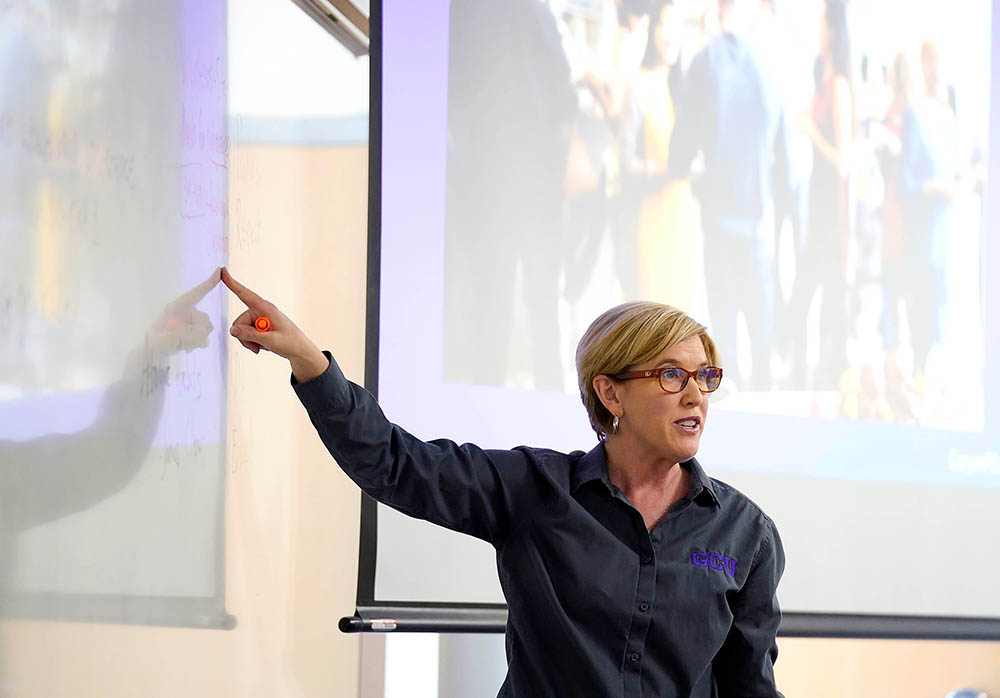
EDITOR'S NOTE: This is the second of three stories focusing on GCU's High School STEM Internship Program. Part three, about the biomedical engineering portion of the program, will be published next week.
The dangers of getting hacked are just a snapshot of the big picture when high school students scroll through their social media accounts.
That’s why Grand Canyon University’s High School STEM Internship Program focusing on artificial intelligence/cybersecurity provides a comprehensive view for prospective college students interested in expanding their knowledge and potentially pursuing this career.
High school juniors and seniors are in the final week of their internships in not only AI/cyber but anatomy/physiology and biomedical engineering. The program is hosted by the Honors College in partnership with the K12 Educational Development Department and the College of Science, Engineering and Technology. The idea is not only to help high school students interested in STEM sharpen their academic skills but to introduce them to GCU's STEM labs, the Research and Design Program, faculty and students.
“They can learn so much, especially in a college environment,” said Alexandra Urbaszweski, a forensics psychology major assisting interns in the five-week course. “A lot of these students don't know a lot about cyber, especially from the technology side.

“They hear technology and say, ‘OK, it's just phones and computers,’ but they don’t know everything about it. They get to come in and get to learn directly from the (GCU) students. I know some of the other programs in the internship are with the faculty, but they get hands on with students with us. You get to learn so much here.”
One eye-opening project was the programming of a Lego Mindstorm car — yes, a robotic driverless car made mostly of Lego blocks.
“This one has two different levels of coding — block coding and Python, which is a programming language used in cyber quite a bit,” Urbaszweski said.
The AI/cybersecurity program includes industry experts lending their insight, but the knowledge gained by interns expands past the basics of artificial intelligence and cybersecurity.
“It’s more diverse than I originally thought it would be because it's not just including hacking and all this typical cybersecurity stuff,” said Aryan Rauniyar, a junior at BASIS Peoria Charter School. “It’s also learning about networking, how our computers work, and how you can build stuff to make it more secure.
“So you look at both sides of it — what you can have and what you need to defend (from hackers). In order to do both things, you need to know the other (side). It’s all super connected. And that’s what surprised me the most because I thought they’d separate things in the beginning (of the course).”
Kira Desai, a senior at Paradise Valley High School, was aware of the high-profile hacking incidents at companies such as Google, Netflix and Amazon before learning about GCU’s AI-cybersecurity internship.
You're learning a lot of basic skills that can be used literally anywhere that you go. It's not going to be confined to one sort of company or one sort of event.
Aryan Rauniyar, BASIS Peoria Charter School junior
Thanks to the courses and guest speakers, Desai has learned how hackers target individuals and companies are attacked, as well as methods used by individuals and companies to protect themselves. The students have worked in small groups or as individuals on projects, such as tryhackme.com, a cybersecurity training course that can feature a simulation of hacking into other computers and servers, and forcing students to use their skills and knowledge so they can infiltrate the servers and extract the information to complete the tests.
“The presentation, demonstrations and displays have been very good,” said Desai, who said she is considering an emphasis on AI/cybersecurity in college.
The internship program is a product of K12 STEM Outreach and its relationship with high-level STEM high schools. A partnership eventually was cultivated between GCU's High School STEM Internship Program and the Honors College to support the interns in the labs, said Cori Araza, Senior K12 Project Director.

Life experiences play a prominent role in the course. Students are taught to be careful about their passwords, particularly if they consider using a personal touch. For instance, the students learned how a hacker can potentially exploit a victim simply by connecting the name of pets and a graduation date through a social media post. A former GCU student who became a private investigator and social engineer spoke recently about these warnings, Urbaszweski said.
The students also have worked with FBI agents who have shared their experiences in cybersecurity.
And that suits Rauniyar.
“You're learning a lot of basic skills that can be used literally anywhere that you go,” Rauniyar said. “It’s not going be confined to one sort of company or one sort of event. These are base knowledge skills that will literally be needed anywhere else if you do anything, whether it’s cybersecurity or anything even remotely related to the internet.”
***
Related content:
GCU News: GCU helps teachers boot up their cybersecurity skills









































































